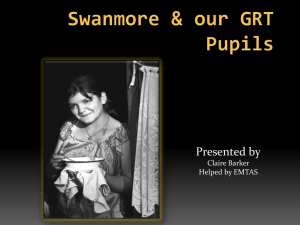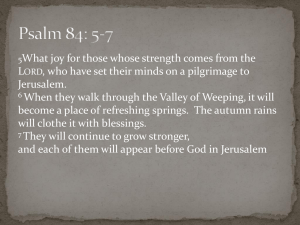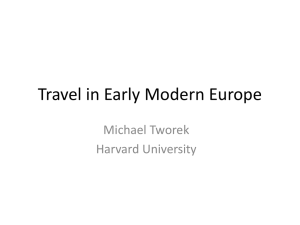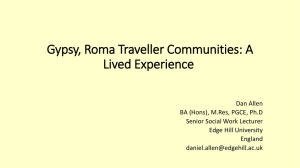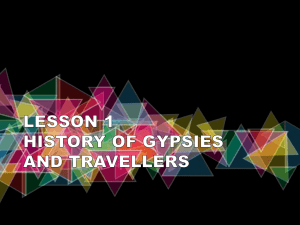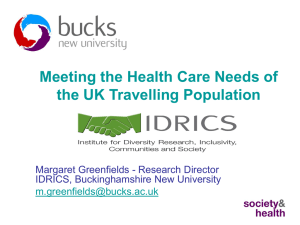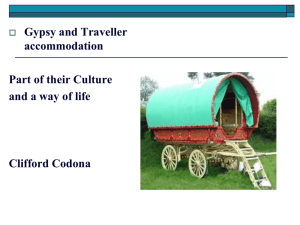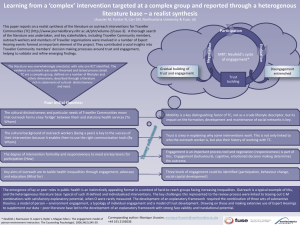Dr Kate D`Arcy
advertisement
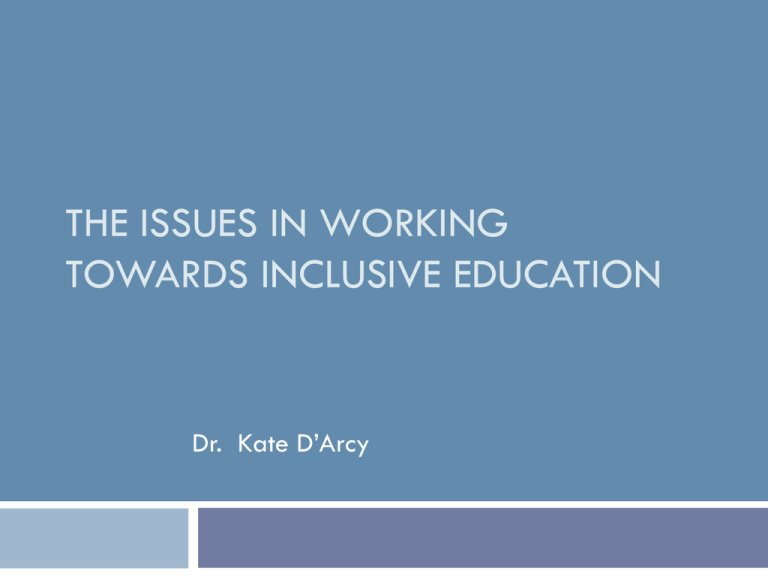
THE ISSUES IN WORKING TOWARDS INCLUSIVE EDUCATION Dr. Kate D’Arcy Overview Background My own research into Gypsy and other Traveller families’ use of and reasons for home education Findings and recommendations Questions for discussion in workshop My study 1) Awareness of issues and barriers in school for Gypsies and other Travellers Racism Bullying Discrimination Negative teacher attitudes Inconsistent or Inadequate support 2) Observations about different Traveller families choosing home education and issues related to this uptake Aims of Research To establish an enquiry to understand more about Travellers’ experiences and perceptions of Elective Home Education (EHE). To illuminate an area of education that lies within a relatively young field of research and has a notable gap regarding Travellers. To enable Travellers’ currently unreported situations to be realised, and that this may lead to a greater understanding of the specific and general educational needs and wishes of Traveller communities. Qualitative methodology Interviewed 11 Traveller families in 1 Local Authority in England 9 Gypsy/Roma 2 Showmen 2 professionals responsible for EHE in the particular county under study. I chose to assert the voices of all Travellers, rather than those of professionals. I use story telling and counter- stories to assert these voices and illuminate ongoing racism and discrimination in educational spaces – Findings are published in my book Research Questions 1. 2. 3. What are Gypsies and other Travellers’ experiences and perceptions of home education ? Why do Travellers choose home education ? Are there emerging issues of inequality concerning Gypsies and Traveller families’ use of EHE ? These are addressed in turn Educational options open to and used by Traveller families Mainstream School Registered as providing EHE Family pays for tutor Family tutors child Not registered in any education Informally based family learning 11 Families Tutor (7) Family (4) EHE practice ‘Basics’: Reading, Writing, Maths and Computers Average – 2 hrs per week. ‘Home-work’ tasks were set by all tutors for between sessions. The length of time these lasted varied and depended on the tutor and the age and ability of the child. Families used academic books for Reading and Writing, Maths and Science. Other activities based on daily life e.g. Children used computers for writing about a bike ride they had gone on that day. Some families did the same thing each day to get in a routine, others did something different every day. One family kept a diary of everything to show the EHE advisor. EHE practices Alongside these ‘basics’ – cooking, needlework, caring for horses, dogs and other animals, helping out with the family business Reflects a vocational, yet gendered model of education. Monitoring visits were 1 x per year, all families appreciated these. Some wanted more frequently and more regular advice and guidance, especially at the start. Why do Gypsies and Travellers chose home education? “Ronnie was being bullied and the school locked him in a room by himself. Davey got anxiety at secondary school and that is why I pulled him out ...” “I was being bullied and I was unhappy at school, I did not like it. I did not have any friends at the school ...” “They did not seem to bother much with him. He hated going...” Reasons........ “My son went to secondary school and had a terrible experience, yes...because he’s a Traveller. He got picked on , even by the teachers. I was not prepared for Rosanne to go through that. We had the same when we went to school, my brother and sisters so..........” “Safer to keep her at home” Problems in School “Its the bullying , they say it does not happen but it do happen…” “That is a big worry with Traveller children...bullying, he had a bit of bullying and he would not entertain it” “The class were all looking at a certain page, the teacher said …‘not you, you look at the picture book, you can’t read or write’” Inequality Reasons for uptake of EHE illuminated inequality in schools Families were compelled to take up EHE because of issues in school... Yet dominant discourse suggests that reasons are related to Travellers’ mobility ! Reasons for EHE : Push and Pull factors The reasons Traveller families took up home education were complex and multi-faceted. I summarises and checked these with families: Push : problems in school (mainly secondary): Bullying Discrimination (by teachers/ children) Traveller children not being safe Being seen / treated differently by teachers Traveller children learning things that are not in keeping with their culture Pull : Safety of EHE ‘Cultural Difference’ I found that in the literature , including government reports on Travellers and EHE there was an overreliance on cultural factors to explain away the difficulties in school and reasons for home educating (mobility & non-interest) The discourse of Travellers’ cultural difference perpetuates these communities as undeserving which impacts significantly on educational policy, practice and children’s opportunities . Racism and Discrimination in School = EHE It is important not to under-estimate the detrimental effect of cultural difference in education Dominant and often inaccurate discourses mean that school may not even ask Traveller parents why they withdraw their children from school. Issues of racism are hidden from view… It has been suggested that EHE is convenient for schools and families alike - Yet this is not just or equitable EHE : Intersections of Inequality Current home education systems are vague and cannot ensure that all children receive a suitable education Because EHE is solely reliant on families financial and cultural capital EHE can perpetuate inequality The most vulnerable (who experience intersections of inequality because of their race, ethnicity, gender, class and additional learning needs), their education is compromised, through no fault of their own Access to Education IS desired Parents wanted their children to attend school but barriers they faced their meant it was not a realistic possibility All families were doing their best with the resources they had available Challenges the concept that Gypsy and other Traveller families are not committed or interested in their children’s education Correlations to other research EHE is also chosen by other ‘vulnerable groups’ who are Othered or stereotypically identified as different : Children with a statement of Special Educational Need Gifted and Talented children because of schools inability to cope with their so-called ‘unusual’ children (Winstanley, 2009) Take up of EHE in county under study Professionals confirmed particular high take up by: Traveller families Parents of children with Special Educational Needs Gifted families with Gifted and Talented children Parents of children who are bullied School-refusers Reasons were problems in school Indicators of educational inequality ... ‘BY DEFAULT’ those who feel compelled to elect for EHE rather than making a positive decision to do so (Badman, 2009) WELFARE Reasons: Discrimination & racist bullying ( 8 /11), unhappy child, lack of social and academic support, positive identity development, cultural dissonance….. Points for consideration..... Despite rhetoric of equal opportunities educational structures and pedagogy reproduce inequality and Travellers’ social exclusion Intersections of inequality; class, gender, social capital, poverty & race EHE –the fact that it serves as a ‘SAFE SPACE’ which is convenient for school & families alike The Yo- Yo effect ? If families want to access education (evidence is that they do ) ..when they arrive and are faced with experiences that reflect their fears - children withdrawn again.............. In this context... How can we make schools safer places to be ? How can we ensure that families don’t take up EHE ‘by default’? How can Travellers’ educational needs be better considered in policy making and practice for school and EHE alike?
